Biography
Tondelli developed an early interest in reading as an adolescent, reading what one might normally expect from a young adult male, Treasure Island, Journey to the Center of the Earth, and various Westerns. As he grew older, his reading tastes would develop. In 1974 he began to write his first narratives, saying: "I have always written, starting at 16 years of age with the usual story about adolescent frustrations". [3] These adolescent frustrations are conflicts between Tondelli's religiosity, his desire to express his artistry, and his homosexual desires as well as a change in Tondelli's belief system, in which he writes: "I find it vulgar to pray to God side by side with people for whom God is different from my God." [4] Tondelli developed a jealousy towards God, who he describes as unique to himself, developing a mysticism all of his own but admitted to losing something as his belief system matured. [4]
Tondelli got his high school diploma in 1974 and then enrolled at the University of Bologna's liberal arts department. There he took courses with Umberto Eco and Gianni Celati. In 1979, he sent a manuscript to Aldo Tagliaferri. Tondelli credits Tagliaferri with teaching and guiding him in his writing, reinforcing upon the young author the necessity of re-writing one's work. A year later in January 1980, Altri Libertini was published. The following month, Tondelli graduated from the University of Bologna.
In April 1980, Tondelli was called up for military service, which was compulsory at the time. He stationed at Orvieto and then in Rome. Tondelli's military service provided him with the necessary experience to write two works, Il diario del soldato Acci and Pao Pao.

Cesare Zavattini was an Italian screenwriter and one of the first theorists and proponents of the Neorealist movement in Italian cinema.
Giovanni Comisso was an important Italian writer of the twentieth century, appreciated by Eugenio Montale, Umberto Saba, Gianfranco Contini and many others.
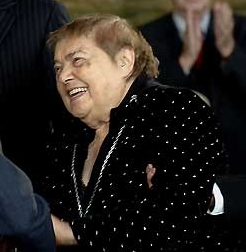
Fernanda Pivano was an Italian writer, journalist, translator and critic.

Carlo Cassola was an Italian novelist and essayist. His novel La Ragazza di Bube (1960), which received the Strega Prize, was adapted into a film of the same name by Luigi Comencini in 1963.

Raffaele La Capria was an Italian novelist and screenwriter.

Luigi Bartolini was an Italian painter, writer, and poet. He is known for his novel, Bicycle Thieves, upon which the Italian neorealist film directed by Vittorio De Sica and of the same title was based. He published over 70 books during his lifetime. His work was also part of the painting event in the art competition at the 1948 Summer Olympics.
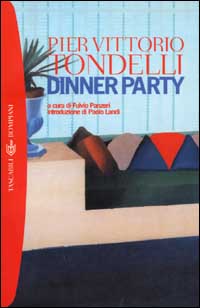
Dinner Party is the only play written by the Italian author and novelist, Pier Vittorio Tondelli, originally in 1985 for the Riccione-Ater Theatre Prize and published by Bompiani in 1994 after Tondelli's death. The play features a series of conversations between the cast of characters, who assemble for an apparent innocent evening dinner on July 11, 1982. This date is significant in that it was the day that Italy won the World Championship in Spain. However, events take an odd turn, and this innocent dinner becomes a comical, unusual drama. As the soccer match takes place, another 'game' takes place on the stage between the various characters at the Oldofredi house, which Tondelli describes as "a cruel yet entertaining game of coups de théâtre, betrayals, revelations and ambiguity."
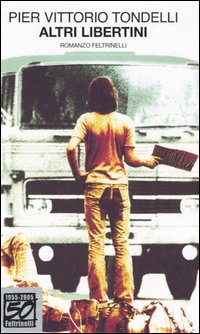
Altri Libertini is the first book by the Italian writer, Pier Vittorio Tondelli.
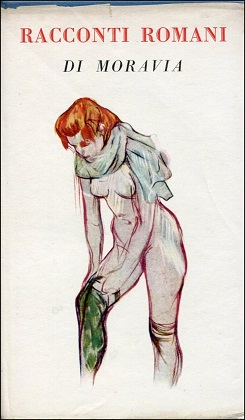
Roman Tales is a series of sixty-one short stories written by the Italian author, Alberto Moravia. Written and published initially in the Italian newspaper, Il Corriere della Sera, they were published as a collection in 1954 by Bompiani. All of the stories are set in Rome or its surroundings after World War II and focus on 'the common people of Rome'. The characters in these stories tend to be the unemployed, ex-convicts, waiters, drivers, con artists, thieves and petty criminals, the average man and the lower classes aspiring to climb out of poverty.

Giuseppina Ronzi de Begnis was an Italian soprano opera singer famous for the roles written for her by the prominent composers of the 1820s and 1830s. Her father, Gaspare, was a prominent ballet dancer and choreographer, and her mother, Antonia, was a ballerina. Her brothers Stanislao and Pollione were opera singers. As a singer, she made her debut in Naples at the Teatro dei Fiorentini in 1814 in Giovanni Cordella's L'Avaro, followed by important engagements in Bologna in 1816, also appearing in Genoa, Florence; in 1817 as Giulia La Vestale, and in Bergamo. She married Italian bass Giuseppe de Begnis (1793–1849) when she was only 16. The marriage lasted only a few years and the two separated in 1825.
Paolo Alberto Brera was an Italian economist, academic, journalist, multilingual translator and novelist.
Igor Sibaldi, born from Russian mother and Italian father, is an Italian writer, scholar of theology and history of religion.
Romano Bilenchi was an Italian novelist, short story writer and essayist. He was born in Siena. He was involved with the resistance movement during the Fascist rule of Benito Mussolini. He was also active in the Italian Communist Party after the war. He founded a magazine, Società, together with Cesare Luporini and Ranuccio Bianchi Bandinelli in 1945.

Marino Alfonso, better known as Mafonso, is an Italian painter and sculptor

Silvia Ballestra is an Italian writer. In 2006 she won the Rapallo Carige Prize.
Enrico Palandri is an Italian academic, writer and translator.
Vittorio Orsenigo is an Italian short story writer, novelist and theatre director. Most of his fame came in the later years of his life, as he developed his career as a writer when he was almost 80.
I Tubi Lungimiranti was a musical group formed in Fano, Italy in 1964. The group was part of the 1960s Italian Beat music movement. They later became a cult group for Dirty Acoustics and Garage Beat.
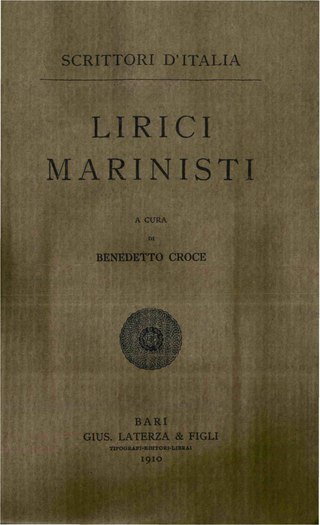
The Scrittori d'Italia was an Italian book collection, published by Giuseppe Laterza & figli from 1910 to 1987 in Bari. The series was born with the intent to define and explain a cultural canon of the new Italy, disassociating from a culture yet considered too much based on the classic of the humanism, and choosing to represent also the civil history of the newborn Italian State. The original work plan included 660 volumes, of which 287 were actually published for a total of 179 works.
Orsola Nemi was an Italian writer and translator.












